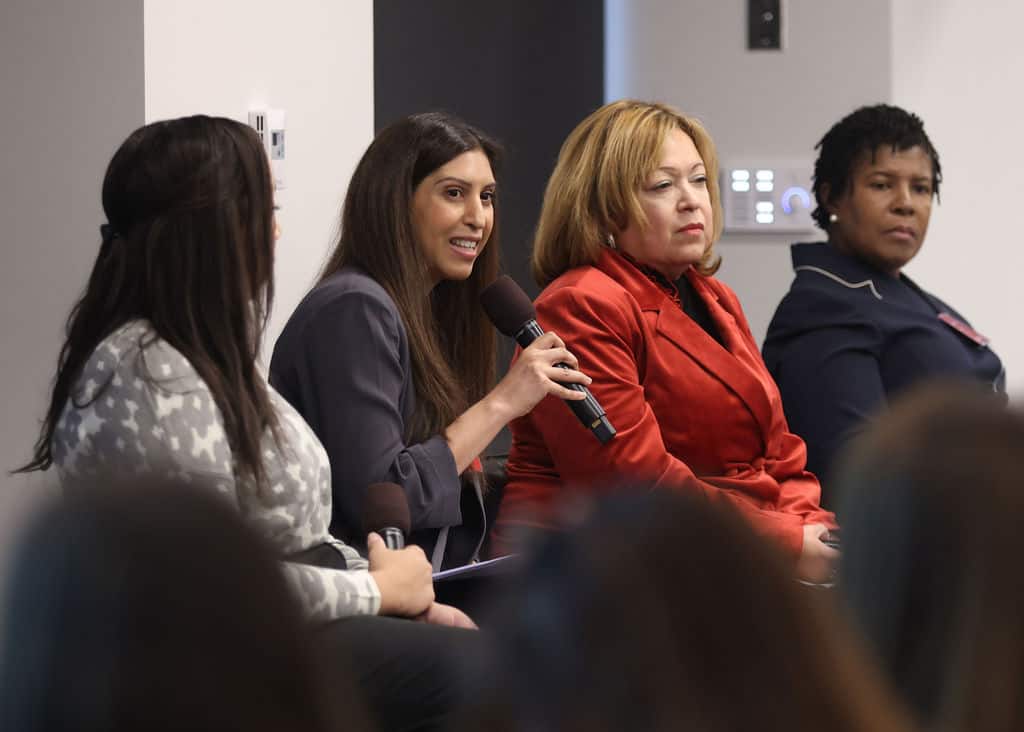
As we and our members continue to explore how to connect, yet distinguish, the concepts of health equity and DEI in our strategies and programming, Tom Browne, MassBio’s Director of DEI, shares some illuminating similarities between the two in the insights shared during a panel titled “Putting Patients First – Health Equity in Drug Development” at MassBio’s recent Patient Advocacy Summit.
Panelists focused on the importance of partnering with patients during clinical trials and drug development to contribute to a more inclusive and patient-informed approach which leads to improved health outcomes for all. The panel featured:
- Nubia Whitaker, Senior Manager, Clinical Trial Diversity & Inclusion, Moderna (Moderator)
- Rosa Colon-Kolacko, PhD, President & Co-Founder, Global Equity Learning Partners
- Ann-Marie La Ronde-Richard, PhD, Director & Patient Engagement Lead, Internal Medicine Research Unit, Pfizer
- Rohita Sharma, Global Senior Director in Patient Insights & Solutions, Alexion AstraZeneca Rare Disease
Culture
The first thing that stood out to me was the way the panelists described how an organization’s culture is the foundation and springboard for any success in clinical trial diversity, just as it is when it comes to any other DEI success within an organization. “You have to at first ask yourself, do you have the right culture in place at your organization to drive a patient-centered approach to drug development?” asked Rohita Sharma of Alexion AstraZeneca Rare Disease, “because if you are focused on the product and not the patient, then you’re not going to think about patient-centered drug development”. This certainly speaks to the fundamental goal we try to encourage our members to pursue: the ability for employees to be themselves and feel a true sense of belonging, rather than focusing on the number of events or initiatives delivered. And in the same way that we support the creation of DEI goals and statements to allow a company to declare its approach to DEI from a corporate level which should filter down to each individual employee, Sharma reminded us that when it comes to inclusive drug development, “every single employee in your organization, irrespective of rank, role, geography, should understand what your purpose is. Why are you conducting the work that you’re doing?”
Accountability
Holding ourselves to account for the DEI pledges made and the way we choose to use the power we possess was also mirrored by the panel. Rosa Colon-Kolacko, President and Co-Founder of Global Equity Learning Partners invited us to consider if these inclusive initiatives are part of our strategic plans and culture, “because if not, it’s just lip service”. She also spoke of the need to “demonstrate authenticity” in our commitments to correct historical wrongs as we focus our energies on being inclusive in the future, using the powerful example of a conference she attended which spoke about reparations for the Tuskegee Syphilis Experiment: “We had a whole session with participants and families that were impacted because of the syphilis studies. The pain in that room was unbelievable. But what was powerful was that we were having the conversation. We were able to say ‘we know that we have done something in the past, but we’re committed to being equitable in the future’”.
Employee and Patient Driven
A third standout similarity was linked to how we regularly advise companies to ensure they are considering how their practices affect individual employees and their engagement at the company, and advocate for co-creating initiatives with employees when appropriate. Developing and rewarding DEI champions and ERGs (employee resource groups) is a tried and tested way of creating vehicles to solicit the employee-voice and ensure DEI initiatives are successful and sustained. Ann-Marie La Ronde-Richard, Director & Patient Engagement Lead, Internal Medicine Research Unit at Pfizer echoed much of this during the panel, suggesting simply that “when we include patients, we do better science”. She went on to provide examples of how trust and credibility in inclusive drug development can be developed by including partners early in the process and reminded us that we don’t always have to offer financial incentives to achieve buy-in. “Patient advocacy groups just want to be part of the process” she says.
If you’re looking to do more in health equity or DEI, reach out to MassBio’s Director of DEI, Tom Browne, at inclusion@massbio.org.